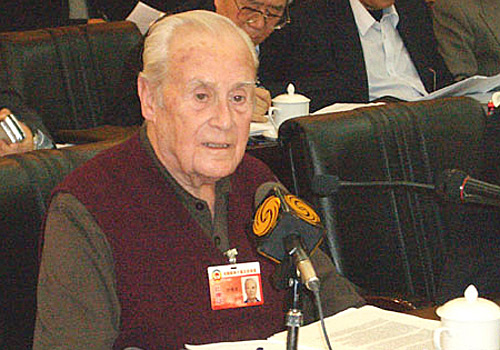|
 |
|
Sidney Shapiro (CHINANEWS.CN) |
In April 1947, Sidney Shapiro arrived by freighter in Shanghai. Little did he know that he had begun an adventure that would span the next five decades.
A lawyer by training, Shapiro went through a crash course in Chinese with the U.S. Army during World War II. When he returned to civilian life, he continued to study Chinese under the GI Bill. Friends then suggested he go to China. In his new autobiography, My China: The Metamorphosis of a Country and a Man, published in 1997 by New World Press in Beijing, Shapiro admits he "was fed up with the rat race, the money grubbing, the wheeling and dealing, which was the milieu of the average lawyer." He went to China with only about $200 in his pocket.
China in 1947 was a country in turmoil. After having occupied the country for years, the Japanese had finally surrendered. General Chiang Kai-shek's Kuomintang had moved into the cities, while Communist troops controlled much of the countryside, or "liberated areas."
During Shapiro's first month in Shanghai, a mutual friend introduced him to Fengzi, a young Chinese actress. Fengzi, which means "phoenix," was actually her stage and pen name. Phoenix became Shapiro's Chinese tutor and, in May of 1948, his wife. Phoenix also was Shapiro's link to the Communist underground in Shanghai. According to Shapiro, Phoenix "was a rebel in an age of rebellion," who ran a Communist-backed magazine.
Anxious to reach the liberated areas, Shapiro and Phoenix flew to Beijing in November 1948. They were there in January 1949 when the People's Liberation Army marched into the city, and they were at Tian'anmen Square on October 1, 1949, when Mao Zedong officially proclaimed the establishment of the People's Republic of China.
Neither Shapiro nor this new society knew quite where he fit. So, in the interim, he decided to translate a new novel, Yuan Ching's Daughters and Sons, for the American market. It was the first novel out of "Red" China to be published in the United States. With approval from Zhou Enlai, Shapiro was assigned to the Bureau of Cultural Relations with Foreign Countries, where he helped launch the then experimental magazine, Chinese Literature. In 1953, he joined the Foreign Languages Press. From then until 1979, he translated contemporary Chinese novels.
Shapiro's daughter and only child, Yamei, was born in January 1950. The "Ya" in her name stands for "Asia" and the "Mei" represents "America." The new family had barely begun their lives together when the Korean War broke out. The war was a devastating experience for Phoenix, who traveled to the front lines. Her anti-imperialist sentiments and hatred toward the United States nearly broke up the couple's marriage.
By the mid-1950s, Shapiro and Phoenix were swept up in the euphoria of building New China. Shapiro writes, "The moral regeneration to me was one of the most stimulating aspects of New China." According to Shapiro, purging the negative aspects of 2,000 years of feudal traditions continues to be China's most serious challenge. Feudalism does have its good aspects, such as respect for parents, teachers and the written word, but feudalism at its worst, he says, is "the respect that fringes on worship of authority."
Shapiro thinks China has "quite sensibly and correctly gotten rid of some of society's bad features but, in smashing the old shibboleths, they have not yet come forward with a new code of morality." For a time there was Mao's Little Red Book, but nothing has come forward to replace it. Shapiro writes, "the main impediment to China's advance is not repression, or bourgeois influences, but a recrudescence of feudal attitudes and practices, and a deterioration of moral values."
In the 1950s, Shapiro marveled at the "magnificent experiment the Chinese were conducting. They were attempting to remold a whole society, to snatch it from a narrow-minded semi-feudal, semi-colonial past and thrust it into a new civilization." In 1963, Sidney Shapiro became a Chinese citizen. Along with the rest of China, he and his family suffered from such failed, Utopian governmental policies as communal agriculture and the Big Leap Forward's attempt at industrialization. Severe food shortages and sudden abandonment by the Soviet Union plagued the "Three Bad Years" of 1959 to 1961.
|

